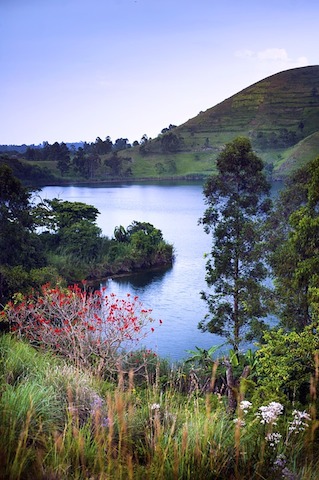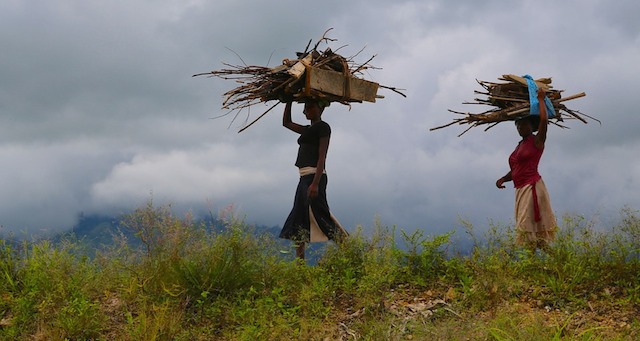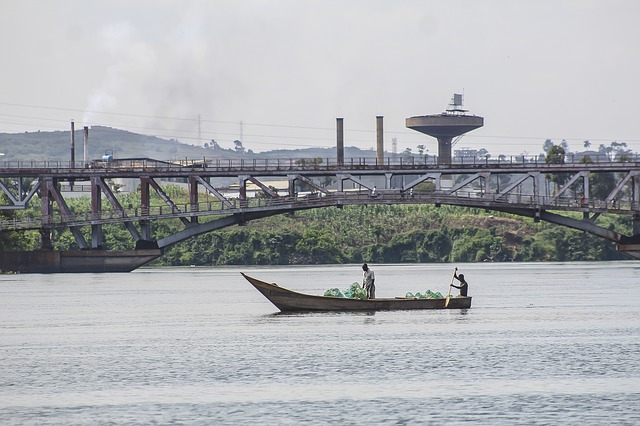Find everything women travelers in Uganda need to know about health, safety, romance, and women’s rights.
All the information below is provided by Pink Pangea community members based on their experiences abroad. Add your voice!
Health
Feminine Hygienic Products
Brittany says: Hygienic products are plentiful, but they will not necessarily be the same brands you are used to. Dove shampoo and soap is fairly easy to find. They also sell an Indian line called “Himalaya” which is excellent and has a variety of soaps, lotions, shampoos, and toothpastes. I was also able to find organic/natural soap fairly easily (in a curio shop for tourists).
Things like makeup, nail polish, and perfume can also be found in supermarkets and pharmacies in big cities and town, but the product quality is not great.
Birth Control
Brittany says: Oral contraception is very cheap and very easy to get. You do not require a prescription and can purchase generic (but mostly reputable) birth control pills from one of the plentiful pharmacies. I purchased three packs of a German-made brand for $1USD.
Condoms are ubiquitous in pharmacies and large chain grocery stores. You can also usually find them in clinics and hospitals.
Romance
Dating Locals
Brittany says: I am married so I did not date. However, I can say that men in Uganda love the idea of dating a foreign woman, and often asked me if I could hook them up with a friend or sibling. As such, local men are over-eager and you should carefully consider their intentions and authenticity before getting serious.
Also keep in mind that almost all men in Uganda date several women at once. This practice is very socially acceptable, so assume that a man you are dating is also dating at least one other woman, even if he doesn’t tell you. Take proper precautions.
Men
Brittany says: Student/Educated Young Person – They usually speak very good English, may have traveled internationally (or will have aspirations to do so), and will be easier to talk to and relate to than many other Ugandan men. They will be interested in exchanging ideas and cultural practices. They will know some interesting places to visit, eat, and drink, and will usually be happy to take you. You will not feel obligated to pay for them, as they will usually have some (though limited) spending money.
Uneducated Street Guy – They will have picked up some English through TV, movies, and music, as well as trying to talk to tourists. They might come off a little rough around the edges, and this is either because they have bad intentions or because they’ve had a rough upbringing. If you befriend this type of person, they will have lots of hidden, very African-type places to show you around town. But you may find yourself paying for their meals and transport.

LGBTQ-friendly?
Brittany says: Not at all. President Museveni recently signed a law making it illegal to be gay. Not only that, but according to the new law, if a straight person knows a gay person and does not report that person, they too can be prosecuted.
Women's Rights
Women’s Rights
Brittany says: The answer is a definite “no,” though the answer is complex. Women in Uganda are strong – they work their fields, raise their children virtually on their own, and often have a full-time job (selling things at the market, cleaning houses, etc). It is often said that if you buy something in the market from a man, his money will go toward alcohol, but if you buy from a woman, you know the money is going to the upkeep of her household.
Women are respected in society by men in small ways, such as getting a seat on a minibus when it’s full. Yet, when it comes to household decision-making – and politics – men have all the power. I believe that, in the mind of most Ugandan men, women are inferior. This is even true if the woman is foreign, as I (and many of my female colleagues) experienced sexism in the workplace.
Local Women
Brittany says: There are a few cultural differences between travelers and local women. First and most important is language. Even though most women in Kampala can speak English – and some very well – they much prefer speaking Buganda and will revert to their language whenever they can.
The second is education. A Ugandan education is quite conservative and traditional. Even if women make it through university, their creativity and innovation haven’t been stretched in the same way as a Western education will do. This affects everything – from the way they approach a problem to the things that interest them and to the way they see the world and their place in it.
The third is family. A Ugandan woman is tied to her family in a way Western women aren’t. She will often live with her own family until married, and she has many familial duties to attend to. This leaves her less free to socialize, go out, pursue hobbies, etc.
Then there are the small things – the fact that we might sit down at a table where they are eating without ourselves having food (very rude); the fact that we rush greetings and get straight to the point; the open way which we talk about everything, but especially men and sex. This makes local women uncomfortable and creates a barrier between us and them.
Women-Specific Environments
Brittany says: Kampala does have a small Muslim population and there are gender restrictions associated with going to the mosque. Other than that, I do not know of any restricted areas for women. However, there are certainly areas in seedy parts of town where a woman would be unwise to visit, lest she be perceived as a prostitute.
Perception of Foreign Women
Brittany says: A white woman doesn’t need to say where she is from in order to be treated differently – her skin announces her foreignness for her. However, if I am asked my country of origin, it is either with genuine interest (an attempt at cultural exchange), out of politeness, or to practice English.
About half the time I tell people that I am from Canada, they respond by saying a cousin or an uncle lives there. It seems that there are many Ugandans abroad, and the ones still in Uganda enjoy meeting someone from a country they can say they have a tie to.
Safety
Transportation
Brittany says: Private taxis are probably the safest method of transportation, providing you have the phone number for a reputable taxi man. The same can be true of motorcycle taxis (boda-bodas). As soon as you hop onto a motorbike (or into a taxi) of someone you don’t know, there is a risk, especially at night. The driver now has the power to take you anywhere he wants, including to an isolated place, where he can rob you, or worse.
Public taxis (minibuses) are generally safe to take, though I have received advice to only hop in if there are other women inside. Once I was in a public taxi alone (with only the driver and the boy who takes the money) but nothing bad happened. I would never have done this at night, however.

Shady Areas for Women
Brittany says: Do not walk in the center of town after dark. You should also never walk on any isolated street, or any that do not have street lights.
Clothing
Brittany says: Ugandan women never show their knees, and often even cover their calves. Though they sometimes wear trousers, they most often wear dresses and skirts.
It seems that wearing tight tops, sleeveless tops, or plunging necklines is much less taboo than showing one’s knees. I would, however, recommend not wearing anything too scandalous on top, since you will already receive much more attention than you could ever want.
Tips for Women Travelers in Uganda by Kate Murray
Food
When you’re spending more time in rural areas or away from western-oriented accommodation or restaurants, Ugandan food will likely be your only predominant option (and it’s cheap). But for the most part, travelers tend towards areas with a greater variety of food.
Indian and Ethiopian restaurants are very common, but there’s even Greek, Mexican, Korean, and more, if you’re in the right place! If you’re in Kampala, you’ll have so much to choose from that you could even get by without eating a “local” meal. But that doesn’t mean you should avoid it!
Starches, starches, meat, starches. This will be your predominant impression of Ugandan food.
Local options have slight variations depending on your particular location, but the common starches include:
- Matooke: Green bananas (similar to plantain) are steamed in their own leaves and mashed. Thick like hearty mashed potatoes but with a little stickiness. In the central region, it’s not a meal without matooke.
- Posho: Maize meal is ground, refined, and cooked in a manner that it becomes like a bread with a pliable, soft consistency that shapes well for scooping up soupy mixtures. Pretty flavorless, but filling! (Known as ugali in the rest of East Africa
- Irish: Boiled potatoes.
- Sweet Potato: This is not the orange yam-like ones but white and with a more subtle sweetness. Usually boiled, sometimes fried.
- Cassava: A starchy root with a consistency similar to potatoes that is sually boiled, sometimes fried.
- Rice: Rice.
- Chapati: This is like a delicious hybrid between a tortilla and naan but usually with a little bit more oil involved in the cooking process.
- Chips: Fries.
Usually you pick one to two of the available starches (they’ll bring you a full plate) and pair it with a meat stew (generally beef, goat, or chicken). Other common items to eat as side dishes, meat-less meals, or otherwise include: beans, peas, cabbage, groundnuts (made of a nut similar to peanuts), sim-sim (made of sesame), and fish. In the north, you get the delight of malakwang, which I’ll just let you experience.
Delicious and quick options that are also a common sight with street vendors include:
- Pork and other meat “muchomo”: It is generally grilled on a stick (like a kebab, nix the veggies).
- “Rolex”: An egg and veggie omelette are rolled up in a chapati. Usually about $1!
- Samosas: The same as the little triangular meat or veggie-filled snack usually found in Indian restaurants.
If you like spicy food, ask for “pili pili”! Usually the tiny fresh pepper, powder, or sauce is available as a condiment.
Vegetarian travelers can certainly maintain their diet while in Uganda, though depending on the circumstances and control over the food they consume, may get tired of rice and beans. I’ve known vegans that do, too, but they definitely take more control of their meals and have to be careful in restaurants.
Tips for Women Travelers in Uganda
But no matter what comes on the plate, it’s particularly important to accept food when it’s offered to you. It’s a courtesy that holds a lot of weight in Uganda. If you can—eat it all! If you’re stuffed—be honest, but try a few bites. If you really, really can’t eat it—assure them that your appreciation is genuine regardless.
If welcomed into someone’s home for a meal, don’t be shocked if, as a female, you’re asked to give a little assistance. While most Ugandans will insist on treating any traveler as a guest, some may want to expose you to the “custom” of women doing the work or would appreciate the gesture of you trying.
Traveling Solo
Traveling solo as a female through Uganda may seem daunting, but it IS possible! Though, of course, you should always keep your safety in mind. Walking alone, being alone, and traveling alone in general certainly can open you up to risk, catcalls, and the like. It’s always best to be confident and plan ahead.
Knowing where you are going and showing your familiarity is a key item that can change an entire scenario, but it’s not foolproof. Certain situations—like being in the bus park at night and alone—should definitely be avoided completely. And no matter your gender—NEVER leave your things unattended!
Traveling with Kids
If you’re traveling with infants or kids, you’ll find that there is plenty to entertain! Uganda has a very patriarchal society, but there is a high level of respect for the childbearing process and the role of parenthood. Breastfeeding does not have to be hidden. Infants and children are welcome into almost all spaces.
Your kids will have hundreds of insta-friends and can partake in many of the types of safaris and excursion there are available. But! You may want to go with a private hire for your transport around the country, as all other forms of transport may have you stuck in unreliable and uncontrolled conditions (not what you want to deal with anytime but especially not with a child in tow!).
Greetings & Languages
Though a simple Google search might tell you that Swahili is the language spoken in Uganda, it is not commonly used unless you are close to the Kenyan border. As with most African nations, the languages spoken across the country vary greatly. However, there is a lot of crossover, and most individuals have familiarity with multiple dialects.
English is the official language within government and schools, so most Ugandans speak English—ranging from a basic grasp to complete fluency. If you know English, you won’t have to worry about getting by at any point. However, knowing some of the local language can add a great deal to your experience!
A basic map of the most common languages can be found on Wikipedia, but here is a little more information regarding the two languages that I have the most familiarity with, and that also cover a wide expanse of the country. In the Central Region, Luganda is the most common language. A few common words or phrases (with informal pronunciation in parentheses):
- Weebale (whe-bva-lay) – thank you (to one person)
- Mwebale (mwe-bva-lay) – thank you (to more than one person)
- Ssebo (say-boww) – sir
- Nnyabo (nye-bow*) – madam
- Mazzi (a-mah-ze)– water
- Nze [insert name] – “I am called [insert name]”
In the North, Acholi is the most common language. A few common words or phrases (with informal pronunciation in parentheses):
- Apwoyo (ah-foy-oh) – thank you
- Kopango? (co-peyn-go) – How are you? (Informal)
- Kope (co-pey) – I’m good. (Informal)
- Icoo ma ber? (ee-cho ma bay) – Is it a good morning?
- Acoo ma ber. (ah-cho ma bay) – Yes it is a good morning.
- Pwudi apwonyo apwonya (foo-di afon-yo afon-ya) – I am just learning.
Places to Go
Most of all, don’t anticipate staying in one place! There’s so much to see, but here’s a few ideas to get you started:
- Lake Bunyonyi and the southwest corner of the country: This region is incredibly beautiful, full of hiking opportunities, gorilla trekking, and wonderful for swimming!
- Jinja: It has much to offer, from whitewater rafting, kayaking, swimming, rope swings, ATVs, and on and on!
- Fort Patiko: Visit if you want to camp with the best views of an amazing sunset, night skies, and an early sunrise.
Accommodations
- New City Annex Hotel of Kampala: It is perfectly located in the city center, near the PostBus, and fairly priced.
- YES Hostel of Fort Portal: This is a fairly priced hostel supporting a great cause, with the bonus of a ping-pong table and the potential of hot-out-of-the-oven freshly baked goods for sale from the director.
- Cosmo Guest House of Gulu: It is reliable, affordable, and just near the center of town.
- Entusi Resort on Lake Bunyonyi: Stay here if you like isolated and magical places.
Restaurants
- Duchess in Fort Portal: Oriented towards foreigners, with amazing Korean beef salad and mocha ice cream.
- Happy Nest: A solid and cheap choice for good local food in Gulu, just across from Cosmo Guest House.
- The Iron Donkey: A new café and guest house in Gulu, serving up scrumptious items including the most perfect oatmeal chocolate chip cookie.
- TAKS Art Centre Gulu: All about their pork and chips, with some kind of magical sauce on it.
- The Little Donkey: A Mexican restaurant in the middle of Kampala. It makes no sense but the margaritas are actually magic.
Tips for Women Travelers in Uganda
Related Reading
I Bought a One-Way Ticket and Moved to Uganda
Living in a Ugandan Village: The Real Deal with Erica Fye
Travel Uganda: Your Guide to a Fabulous One-Week Trip
I Fell into a Ditch in Uganda. Then the Incredible Happened.
The Three Things that Shouldn’t Stop You From Traveling to Uganda
How Ugandan Women are Fighting for Feminism

